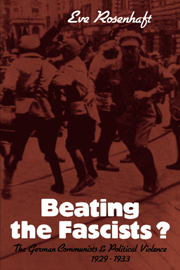Book contents
- Frontmatter
- Contents
- Preface
- List of abbreviations
- Map 1 Greater Berlin 1930
- Map 2 Central Berlin 1930
- 1 Introduction: Social crisis, radical politics and organized violence in Weimar Germany
- 2 The Party, the neighbourhood and the uses of violence in the ‘Third Period’
- 3 Defining the enemy: The wehrhafter Kampf against the SA in theory and propaganda
- 4 Organizing the wehrhafter Kampf: The Communist defence formations
- 5 Between ‘individual terror’ and ‘mass terror’: The campaign against the SA-taverns, 1931
- 6 The shape of violence in the neighbourhoods
- 7 Who were the streetfighters?
- 8 Conclusion: Communist politics in the Weimar Republic
- A note on sources
- Notes
- Bibliography
- Index
7 - Who were the streetfighters?
Published online by Cambridge University Press: 05 March 2012
- Frontmatter
- Contents
- Preface
- List of abbreviations
- Map 1 Greater Berlin 1930
- Map 2 Central Berlin 1930
- 1 Introduction: Social crisis, radical politics and organized violence in Weimar Germany
- 2 The Party, the neighbourhood and the uses of violence in the ‘Third Period’
- 3 Defining the enemy: The wehrhafter Kampf against the SA in theory and propaganda
- 4 Organizing the wehrhafter Kampf: The Communist defence formations
- 5 Between ‘individual terror’ and ‘mass terror’: The campaign against the SA-taverns, 1931
- 6 The shape of violence in the neighbourhoods
- 7 Who were the streetfighters?
- 8 Conclusion: Communist politics in the Weimar Republic
- A note on sources
- Notes
- Bibliography
- Index
Summary
It remains to examine the lives of the streetfighters as a group, and to consider how the personal, social and economic conditions reflected therein may have influenced their actions. My concern here is less to speculate about the fighters' states of mind than to catalogue the evidence of their ‘objective’ circumstances, but the question of motivation is never very far away. We are bound to try and guess what it is that links the social circumstances which we can describe to the actions that we know, if only because the evidence on the streetfighters' lives provides a valuable test of previous observers' attempts to relate political attitudes and social conditions. Three such approaches have to be confronted. The first, the conviction of the KPD leadership that the Party's ‘terrorist’ element was made up of socially and politically marginal men, and particularly of the unemployed as such, has already been addressed in the previous chapter. It shares with the second, the view that widespread political violence represents an outbreak of irrational behaviour in direct response to material distress, a tendency to define the streetfighters and their actions in negative terms. Because they were not mature, employed, thoughtful, intellectually or industrially schooled, because they had no place in a system that was itself not functioning very well, they acted in politically and socially unacceptable ways. The data presented in this chapter offer a simple answer to this view. What we have here is not a free-floating mass of deprivation and frustration but a group of people with very distinct, if not unambiguous, social and occupational features.
- Type
- Chapter
- Information
- Beating the Fascists?The German Communists and Political Violence 1929–1933, pp. 167 - 207Publisher: Cambridge University PressPrint publication year: 1983



